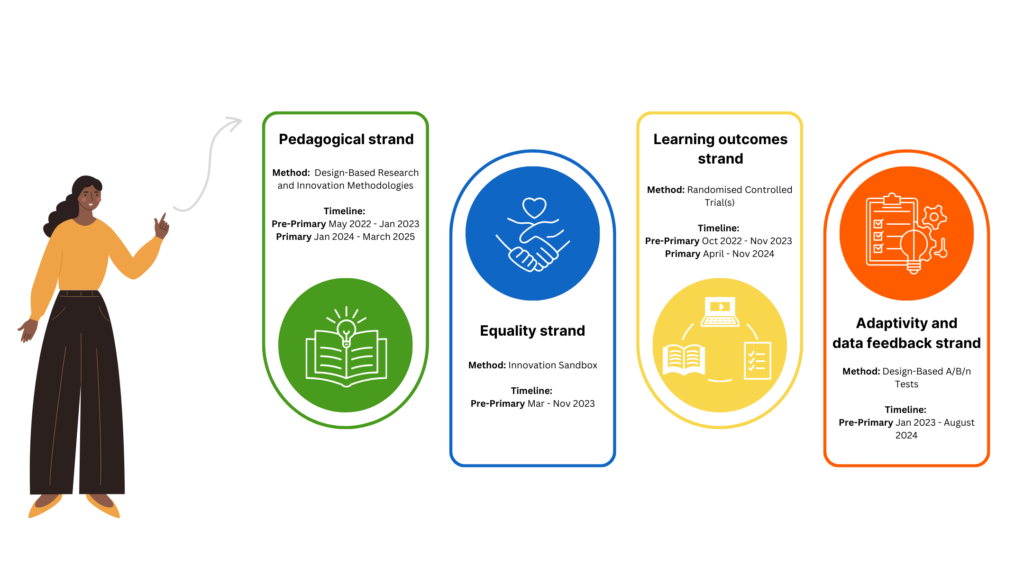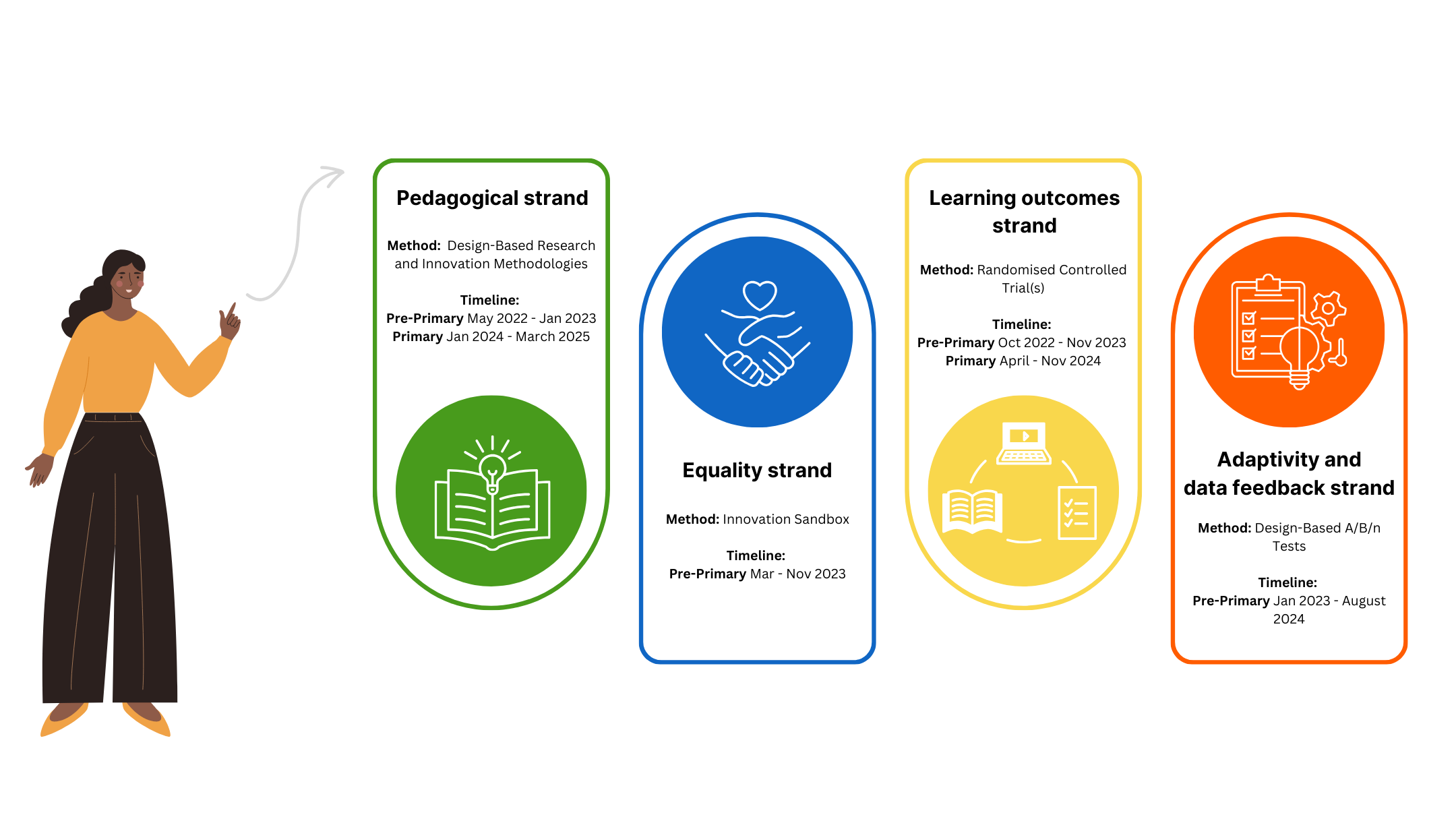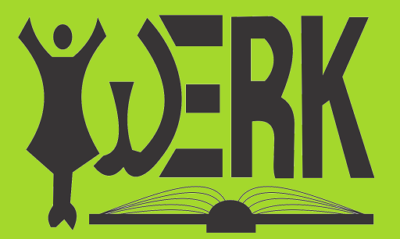Digital Personalised Learning to Improve Literacy and Numeracy Outcomes in Kenyan Classrooms
Country: Kenya | Topic Area: Digital Personalised Learning
Quick links
Project summary
Digital Personalised Learning (DPL) tools could play an important role in achieving better learning outcomes in low- and middle-income countries (LMICs). However, there is limited research investigating the effectiveness of using DPL in LMIC classrooms to improve early grade literacy and numeracy.
This multi-strand research study is addressing this important gap by rigorously evaluating contextually appropriate pedagogical and software approaches for integrating DPL into pre-primary schools in Kenya. The research is focusing specifically on the use of a DPL tool developed by EIDU, deployed on low-cost Android devices. The tool integrates digital personalised learning content with digitised structured pedagogy content, enabling the alignment of digital learning with classroom instruction. The software also facilitates adaptive assessment and measurement strategies, generating continuous insights into learning.
The research currently consists of four strands, each of which explores a different core component of DPL and its integration into classrooms.
Principal research question
Each strand of the research has a set of specific research questions, each of which fall under the study’s overarching research question:
How can a classroom-based, digital personalised learning tool most effectively support early-grade numeracy and literacy outcomes in Kenya?
Research strands and findings
This study involves four interlinked research strands. Each strand is led by core members of the research group and has been executed in collaboration with field experts.

Pedagogical strand
While digital personalised learning tools can offer many benefits, there is limited evidence from LMICs about their integration into classroom practice. Factors such as the alignment of DPL content with the curriculum and the role of the teacher are central to this process. This strand therefore involves working closely with teachers to explore the pedagogical implications of using the EIDU DPL tool in Kenyan classrooms.
Publications and related content
Coming soon: Integrating digital personalised learning into early-grade classroom practice: a teacher-researcher design-based research partnership in Kenya
Coming soon: Design and Implementation Factors for Digital Personalized Learning in Low- and Middle-Income Countries
Read the conference abstract for: Evaluating digital personalised learning in Kenya: An exploratory analysis of integrating an adaptive learning tool into classroom instruction
Equality strand
Integrating DPL into classroom practice may – as in the case of the EIDU model – involve a DPL tool being shared between learners during the school day. It is therefore important to consider how to encourage equitable device utilisation. This strand uses sandbox innovation approaches to develop strategies which optimise equal access to learning of the EIDU DPL tool in pre-primary classrooms.
Related content
[coming soon]
Learning outcomes strand
There is limited evidence about the impact of classroom-integrated DPL tools on learning outcomes in LMICs. This strand involves assessing the impact of the EIDU DPL tool, aligned with structured pedagogy, on numeracy and literacy outcomes in pre-primary classrooms, via two randomised controlled trials.
Publications and related content
Coming soon: Digital Personalised Learning to improve literacy and numeracy outcomes: A randomised controlled trial in Kenyan pre-primary classrooms
Read the research protocol on: Randomised Controlled Trial Protocol – Digital personalised learning to improve literacy and numeracy outcomes in Kenyan classrooms
Adaptivity and data feedback strand
The software design of DPL tools offers a myriad of ways to adapt learning content to be relevant to learners’ needs and to provide continuous assessment data to teachers. This strand therefore explores the potential of optimising the software affordances of the EIDU tool and integrating digital assessment tools into the teaching and learning process to enhance learning outcomes.
Publications and related content
Coming soon: Enhancing Literacy and Numeracy Through Teacher Dashboards and Digital Personalised Learning in Kenyan Early Years Education
Read the evidence brief on: Testing Digital Timer Tools to Support Early Grade Lesson Delivery
Read the blog on: digital personalised learning in Kenya: utilising A/B testing to evaluate software adaptivity features
Background evidence
Read the rapid evidence review on: technology-supported personalised learning
Read the meta-analysis on: the effectiveness of technology-supported personalised learning in low- and middle-income countries
Study contacts
Louis Major, Principal Investigator — Contact Louis
Rebecca Daltry, Research Manager — Contact Rebecca
Annette Zhao, Research Associate
Jessica Hinks, Research Associate
Chen Sun, Research Associate





